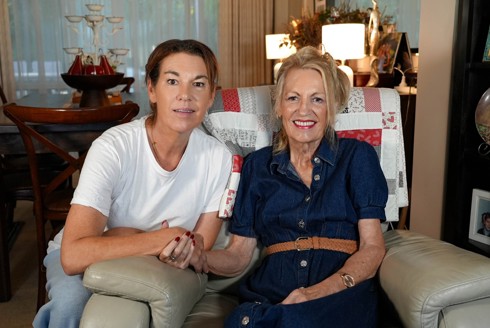Improving the lives of people living with a life-limiting illness
10/09/2025

Mother of six Trish Jamieson, of Belrose, 19km northeast of Sydney's CBD, has been to hell and back since she was diagnosed with non-curable oesophageal cancer after experiencing mystery symptoms, including difficulty swallowing, while on a holiday.
It all started in 2018. She quickly found herself confronted by a world of doctor’s appointments and scans, major surgery and treatments. The focus was on her body, and nobody asked how she was feeling.
“Oesophageal cancer is not like breast cancer – there are no support groups, not even a general support group at the hospital, only specialised groups for some” said Trish, also a grandmother of 15.
A bright spot for her was joining an Embrace group last year after learning of the sessions as a HammondCare Northern Beaches Community Palliative Services patient.
Embrace is an Australia-first program, developed by HammondCare, designed to offer an intervention for people with a life-limiting illness, who often experience spiritual and existential distress.
The program draws on the growing evidence for post-traumatic growth where highly challenging life circumstances can lead to positive psychological change.
Research published this month in Patient Education and Counseling by Melanie Lovell, Kerry Warner, Peter Archer, Rebecca McCabe and Philip Siddall described the development of the novel intervention.
Feedback from two pilot Embrace groups and follow-up participant interviews was a key part of ensuring the intervention was feasible and effective.
“This intervention developed using a post traumatic growth framework has the capacity to improve the lives of people living with a life-limiting illness while receiving palliative care,” the researchers wrote. The research was supported by the David and Judith Taylor Foundation and the HammondCare Foundation.
Trish, blessed by the wonderful support of husband Geoff and her large family, said the group-based format with others in a similar health situation created a “safe place” for her to express her frustration and anger at circumstances, while ending each meeting on a positive note. She said it was “wonderfully freeing”.
“You can’t always voice your feelings with your family. There is always a discomfort with talking honestly with them, you don’t want to bring them down,” Trish said.
Trish describes her present health circumstances as “stable”. Her Embrace program finished last year but adds “I have to say I miss it.”
Dr Peter Archer, one of the developers of the program, said the program allowed people with life-limiting health challenges to consider important life questions in an “intentional and systematic” way.
More than 30 patients have gone through the program at Greenwich and Neringah Hospitals and the Northern Beaches Community Palliative Service since 2023 with expansion expected to Braeside Hospital soon.














